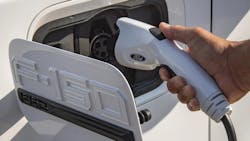Southern Company and Ford Pro Complete Managed Charging Pilot for EV Fleets
Southern Company and Ford Pro have completed a six-month pilot program aimed at testing managed charging for electric commercial fleets and its impact on the electric grid.
The program, launched earlier this year, evaluated how Southern Company could shift charging for its fleet into lower-cost periods, respond to grid signals, and maintain operational readiness. The findings are expected to inform future electric vehicle (EV) customer programs and provide a framework to support large-scale fleet electrification.
Pilot Design
The test involved more than 200 Ford F-150 Lightning trucks and over 150 Level 2 AC Ford Pro Chargers across Southern Company subsidiaries. Using Ford Pro Intelligence, data from vehicles and chargers was collected to monitor charging patterns and energy use.
Southern Company’s fleet, which operates across multiple states, served as the pilot’s testing ground. The study demonstrated that managed charging could balance energy demand while ensuring drivers had consistent access to charging.
Results and Findings
During the six-month trial, Southern Company used Ford Pro’s software to control charger availability and assess the effect of charging during peak times.
“Ford Pro’s energy management algorithm was able to throttle chargers to avoid windows of peak grid demand, shifting charging within the drivers’ existing charging window while still ensuring that drivers got the energy they expected out of a charging session,” said Tom Canada, fleet electrification project manager at Georgia Power, a Southern Company subsidiary. “The insights gleaned from this pilot represent valuable learnings that can be applied to help us manage our electric vehicle fleets more efficiently and help us better advise customers who may approach our electric utilities for advice about managed charging for their fleets.”
The pilot also included demand response tests in which charging was paused during periods of high demand and pricing. Southern Company reduced total charging demand by 0.5 megawatts (500 kW) during a 30-minute event, averaging about 10 kW of savings per charger. These tests were conducted three times at varying times of day and duration.
Throughout the process, Southern Company maintained fleet operations without interruption. The study showed that managed charging could deliver energy savings, support grid efficiency, and maintain reliability for drivers.
Looking Ahead
The pilot highlighted how integrating vehicle and charger data with software can provide utilities and fleet operators with insights into charging efficiency, energy savings, and overall grid reliability.
